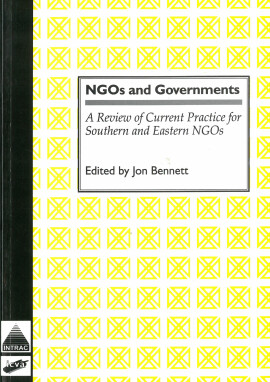
NGOs and Governments
Review of current practice for and southern and eastern NGOs
One of the key determinants of NGOs' contribution to development in general - and in articulating the concerns of the poor in particular - is their relationship with the state. NGOs have grown enormously in numbers over the past 20 years and have an ever-widening scope of work, to the extent that they are now concerned or involved with almost every aspect of human need and endeavour. This has sometimes led to a confusion in their role and function. Many governments have voiced concerns over the breadth of NGO activities that threaten to undermine or divert funds away from traditional state mechanisms. At the same time - partly in response to this perceived threat - models of good policy and practice have emerged which provide useful indicators and standards of behaviour for NGOs, their donors and governments.
The case studies, guidelines and analyses presented in this book look more closely at the complexities involved in the NGO-government dialogue. The issue of governance underpins much of the writing, for in coming to terms with their roles in relation to the state, NGOs have increasingly assumed a political function: that of challenging and redressing the status quo in favour of people-centrered approaches to development.
Published: 1997
Pages: 194
Paperback: 9781897748251
The case studies, guidelines and analyses presented in this book look more closely at the complexities involved in the NGO-government dialogue. The issue of governance underpins much of the writing, for in coming to terms with their roles in relation to the state, NGOs have increasingly assumed a political function: that of challenging and redressing the status quo in favour of people-centrered approaches to development.
Jon Bennett
Jon Bennett has had 30 years’ experience in Africa, Asia and Eastern Europe including Country Representative/Field Director posts and independent consultancies for development agencies – ranging from the UN, EU and NGOs.





